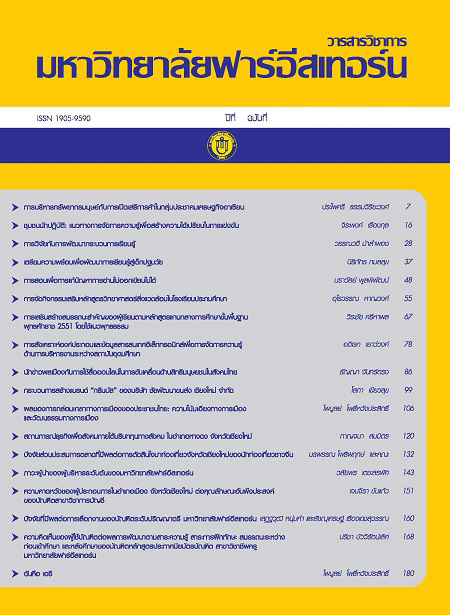แนวทางการบริหารการเปลี่ยนแปลงของมหาวิทยาลัยมหามกุฏราชวิทยาลัยในทศวรรษหน้า
Main Article Content
Abstract
การวิจัยนี้มีวัตถุประสงค์ เพื่อศึกษาสภาพการบริหารการเปลี่ยนแปลงของมหาวิทยาลัย
มหามกุฏราช วิทยาลัยในปัจจุบัน และศึกษาแนวทางการบริหารการเปลี่ยนแปลงในทศวรรษหน้า ซึ่งจะศึกษาตามกรอบแนวคิดของแมคคินซี่หรือแบบจำลอง 7-S โดยใช้เทคนิคการวิจัยอนาคตแบบเดลฟาย
กลุ่มตัวอย่างที่ใช้ได้แก่ ผู้ทรงคุณวุฒิจำนวน 25 คน และบุคลากรภายในของมหาวิทยาลัยได้แก่ ผู้บริหาร อาจารย์และเจ้าหน้าที่ จำนวน 350 คน วิเคราะห์ข้อมูลโดยใช้สถิติค่ามัธยฐาน ฐานนิยม ค่าพิสัยระหว่าง
ควอไทต์ ค่าเฉลี่ย และส่วนเบี่ยงเบนมาตรฐาน ผลการวิจัยพบว่า จุดแข็งของมหาวิทยาลัยเน้นการศึกษาด้านพระพุทธศาสนาเป็นหลัก แต่มีจุดอ่อนคือ ผู้บริหารยังขาดประสบการณ์ในการบริหารจัดการองค์กรขนาดใหญ่ ส่วนโอกาสของมหาวิทยาลัยคือ การที่มีค่าหน่วยกิตและค่าใช้จ่ายถูกกว่ามหาวิทยาลัยอื่นๆ แต่มหาวิทยาลัยก็มีแนวโน้มที่จะประสบกับปัญหาคือ มหาวิทยาลัยทั้งของภาครัฐและเอกชนมีการเปิดวิทยาเขตทั่วประเทศซึ่งจะทำให้มีการแข่งขันทางการศึกษาค่อนข้างสูง ดังนั้นแนวทางการบริหารของมหาวิทยาลัยในทศวรรษหน้า ผู้บริหารจึงควรปรับปรุงระบบโครงสร้างการบริหารงานและกฎระเบียบต่างๆ ให้มีความยืดหยุ่นมีความเป็นสากล โดยจัดระบบการทำงานเชิงบูรณาการแบบมีส่วนร่วมให้บุคลากรทุกคนมีส่วนร่วมตัดสินใจ สร้างเครือข่ายทางวิชาการกับสถาบันอื่นทั้งภายในและภายนอกประเทศ ในด้านการพัฒนาทรัพยากรบุคคล ผู้บริหารควรมีการสร้างความกระตือรือร้นให้กับบุคลากรในองค์กรโดยเสริมสร้างขวัญกำลังใจในการปฏิบัติงาน นอกจากนี้ควรมุ่งเน้นสร้างองค์ความรู้สู่ความเป็นเลิศทางวิชาการด้านพุทธศาสนาซึ่งเป็นจุดเด่นของมหาวิทยาลัย และพัฒนามหาวิทยาลัยให้เป็นแบบอย่างที่ดีทางด้านศีลธรรม สร้างสันติสุขให้เกิดในสังคมชุมชนและท้องถิ่น และเป็นผู้นำทางปัญญาให้กับสังคมไทยและสังคมนานาชาติต่อไป
The purposes of this research were to study the change management of Mahamakut Buddhist University at present, and to investigate the guidelines for change management of Mahamakut Buddhist University in the next decade as well as its feasibility, which will be studied according to the McKinsey 7’s Frameworks by using the Delphi Technique. The sampling cohorts included 25 learned
people and the University personnel consisting of executive, faculty staff, and officers for a total of 350. The study data were analyzed by means of median, mode, interquartile range, mean, and standard deviation. Results of the study were as follows: The strength of Mahamakut Buddhist University is that it is a university focusing on Buddhist studies. It could turn out the graduates who are endowed with knowledge and morality. However, the University still has the weakness, that is, the executive lacked experiences and efficiency in international standard management. But the University has its opportunity in the sense that tuition fees and other expenses to be borne by students who entered the University are cheaper than those of other universities. Yet, the University still has a threat, that is, a large number of universities, both public and private, have set up their regional campuses across the country, leading to keen competition. As regards the guidelines for change management in the next decade, the executive should improve administration structure and rules and regulations of the University to make them more practical and universal through integrated operation by allowing University personnel to participate in decision making, creating academic networks with emphasis on retroactive relationship, both nationally and internationally. In view of human resource development, the University should provide the personnel with ambition to have career growth and incentives in performance. Additionally, the University should concentrate on developing outstanding skills of its personnel, and develop process and team-based administration system, emphasizing personnel participation in administration at all level. In addition, the University should build up Buddhism-based academic excellence to an extent that it has become a sustainable identity of the University through developing it to be a moral ethical model for others so as to bring about peace and happiness in society, community and locality. Yet, the University should manage to achieve intellectual leadership for national and international society at large.
Article Details
1. Any views and comments in the Journal of Social Innovation and Lifelong Learning are the authors’ views. The editorial staff have not to agree with those views and it is not considered as the editorial’s responsibility.
2. The responsibility of content and draft check of each article belongs to each author. In case, there is any lawsuit about copyright infringement. It is considered as the authors’ sole responsibility.
3. The article copyright belonging to the authors and The Far Eastern University are copyrighted legally. Republication must be received direct permission from the authors and The Far Eastern University in written form.

